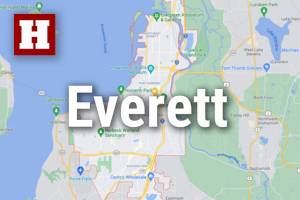Fake coronavirus test sites pop up in Edmonds
Published 5:11 pm Wednesday, April 28, 2021
EDMONDS — Two phony COVID-19 test sites sprang up Tuesday in downtown Edmonds and local police are warning people to beware.
One was in front of the Starbucks at Fifth Avenue South and Main Street, and the other was near the ferry terminal at 199 Sunset Ave. S, according to Edmonds police Sgt. Josh McClure.
The sites have since been removed. Edmonds police had not cited or arrested any suspects as of Wednesday afternoon. Police are continuing to investigate, McClure said.
Each fake testing site was set up with a folding table and medical-appearing paraphernalia resembling that used for COVID-19 tests.
“They had forms, clipboards and stuff to make it look very official,” McClure said.
Fraudulent health care workers instructed people to provide personal information — such as names, birthdays, contact information and insurance details — for the fake tests. People were told they’d receive test results back in two days.
Reports from concerned citizens alerted police to the phony test locations, McClure said, partly because the sites appeared “hastily prepared.”
The Edmonds Police Department urges people to only provide their personal information to verifiable COVID-19 test sites and other trusted health care providers.
Legitimate test sites can be found on an official city government website or information source, McClure said.
Several other reports of fake COVID-19 testing sites have cropped up around the country in states such as Arizona, Georgia, Kentucky and New York, according to the AARP Fraud Watch Network.
“Where there is fear, there are dollars to be made,” Cynthia Lucas, vice president of anti-fraud initiatives for the National Health Care Anti-Fraud Association, told AARP. “Beware of testing sites that advertise on social media. Rely on reliable sources. Also, legitimate medical testing sites don’t demand cash for tests and don’t set up sites in gas station parking lots.”
There are other kinds of COVID-19-related scams out there, as well.
The U.S. Department of Health and Human Services Office of Inspector General recently alerted the public about fraud schemes using telemarketing calls, text messages, social media platforms and door-to-door visits.
Fraudsters have offered COVID-19 tests, federal grants and Medicare prescription cards in exchange for personal details, including Medicare information. The personal information collected can then be used to fraudulently bill federal health care programs and commit identity theft.
Ellen Dennis: 425-339-3486; edennis@heraldnet.com; Twitter: @reporterellen




